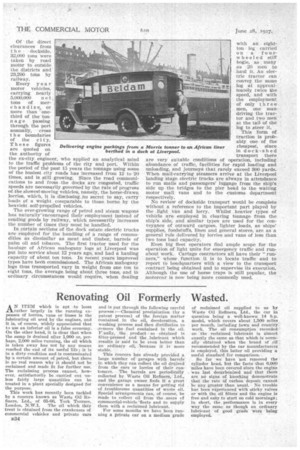Renovating Oil Formerly Wasted.
Page 52

If you've noticed an error in this article please click here to report it so we can fix it.
AN ITEM which is apt to loom rather largely in the running expenses of lorries, vans or buses is the lubricating oil used by the engines, and it is, of course, widely appreciated that to use an inferior oil is a false economy. On the other hand, it is clear that when the sump is drained after 1,000 or, perhaps, 2,000 miles running, the oil which is taken away has not by any means reached the end of its useful life ; it is in a dirty condition and is contaminated by a certain amount of petrol, but there is no real reason why it should not be reclaimed and made fit for further use. The reclaiming process cannot, however, satisfactorily be carried out unless fairly large quantities can be treated in a plant specially designed for the purpose.
This work has recently been tackled by a concern known as Waste Oil Refiners, Ltd., of 65-66, York Terrace, London, N.W.1. The oil which they treat is obtained from the crankcases of commercial vehicles and private cars 1134 and is put through the following careful Process :—Chemical precipitation (by patent process) of the foreign matter contained in the oil, decoloration, a washing process and then distillation to -.remove the fuel contained in the oil.
the product so obtained is filter-pressed and the_ lubricant which results is said to be even better than an ordinary oil, because it is more stable.
This concern has already provided a large number of garages with barrels . in Which they can collect the oil drained from the cars or lorries of their customers. The barrels are periodically collected by Waste Oil Refiners, Ltd., and the garage owner finds it 'a great convenience as a means for getting rid of _troublesome quantities of waste oil. Special arrangements can, of course, he made to collect oil from -the -users of commercial-vehicle 'fleets and to supply them with a reclaimed lubricant.
For some months we have been running a private eat on a medium grade
of reclaimed oil supplied to us by Waste Oil Refiners, Ltd., the ear in question being a well-known 14 h.p. model, which covers about 1,500 miles per month, including town and country work. The oil consumption recorded on the reclaimed lubricant is almost exactly the same as that which is normally obtained when the brand of oil recommended by the car manufacturers is employed, this latter oil providing a useful standard for comparison.
So far we have not removed the cylinder head. but the facts that 6,000 miles have been covered since the engine was last decarbonized and that there are no signs of knocking demonstrate that the rate of carbon deposit cannot be any greater than usual. No trouble baa been eiperienced with sticky valves or with the oil filters and the engine is free and eah to start on cold mornings; in short, the performance is in every way the same as though an ordinary lubricant of good grade Were being employed.




































































































